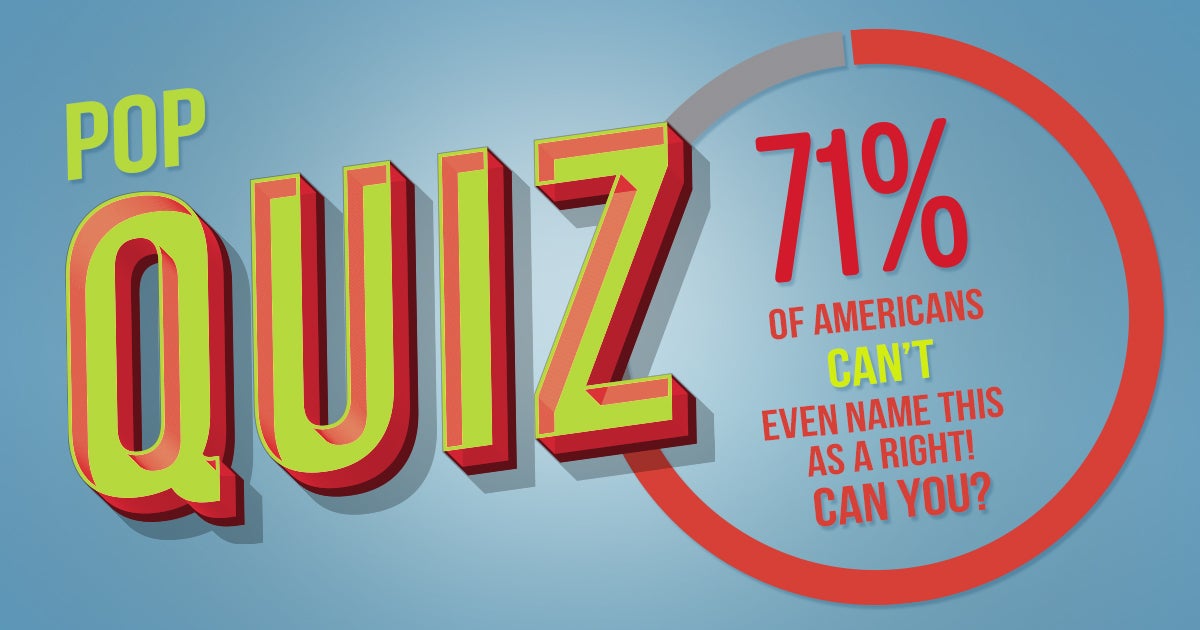
by Liberty McArtor • 5 min read
How well do YOU know the First Amendment?
Can you name all the freedoms and rights that it protects?
The Freedom Forum Institute recently released its 22nd annual State of the First Amendment Survey. Every year, the survey asks Americans how much they know about the First Amendment of the Constitution, and what they think about its everyday applications.
This year’s survey shows that Americans are actually growing in their knowledge of the First Amendment, which is good news indeed. At the same time, the survey data reveals there’s much improvement and progress that still needs to be made.
Below you’ll find five key takeaways from this most recent survey, and then you can test your own knowledge with our First Freedom Quiz!
Freedom of religion was the second-most commonly remembered freedom among survey participants. The scary part? Only 29% remembered it! That means that 71% can’t name religious freedom — our first freedom listed in the First Amendment — as a First Amendment right.
Let’s put that into context. The survey found that 64% of Americans recalled freedom of speech as a First Amendment right, meaning that there’s a 35% gap between recalling freedom of speech and religion – and that’s shocking when you consider that freedom of speech is the second freedom listed in the First Amendment.
You know the old saying: knowledge is power. The first step in preserving religious freedom for all Americans is making sure Americans know that right exists. Without that knowledge, more people are going to be vulnerable to violations of their religious liberty, and fewer will be equipped to take a stand to defend it.
Most Americans are in favor of protecting free speech online. The State of the First Amendment survey revealed that 65% of Americans agree that banning social media users violates their First Amendment rights.
This is especially important in our present day, when large social media companies are increasingly and more frequently being scrutinized for banning or censoring people of faith or religious organizations. Religious and conservative ideas seem to be the most popular targets. In fact, just last year, Facebook banned ads from Dallas-area Cottonwood Creek Church promoting an Easter service. Thankfully, Facebook was quick to resolve the issue after our legal team intervened.
As private companies, social media sites are free to disregard the First Amendment’s guarantee of free speech. We don’t hold private companies to the same standard as government entities, and that’s a good thing because it allows private companies to have their own identities or speech.
Still, there is something different about giant social media networks who hold themselves out as neutral and open to everyone. These are the new public parks. These are the new libraries. This is where people dialogue, share their views, and get a significant amount of their information.
These companies should recognize that the best answer to speech that they find hateful or offensive is more speech, not less. The way to combat bad ideas is to expose them to the light, not to let them fester in the shadows or to censor them.
64% of people surveyed agreed with this statement: “Public school students should be allowed to report on controversial issues in their student newspapers without the approval of school authorities.”
This is great news — and coincides with the 50th anniversary of Tinker v. Des Moines Independent Community School District, a landmark Supreme Court case. As the survey notes, that case protected the speech rights of students. But what many people don’t know is that it has also been crucial in protecting students’ religious freedom.
In the majority opinion, the Supreme Court ruled that students do not “shed their constitutional rights to freedom of speech or expression at the schoolhouse gate.” Whether that expression comes in the form of a controversial op-ed in the school newspaper, or a personal prayer during a graduation speech, students can rest easy knowing the First Amendment is on their side.
Even more Americans support students’ freedom to post content on social media without fear of retaliation. This seems like a no-brainer, right?
Unfortunately, censorship of students’ expression is a growing concern.
In the past, First Liberty has defended students who were threatened for things as simple as wearing a cross necklace in college, and passing out personal gifts with religious messages in elementary school. If schools punish students for actions like these, what would stop them from punishing a student for posting about his personal religious beliefs on social media?
It’s reassuring to see that regardless of what schools may try to do, 72% of Americans support students’ freedom of expression on social media.
At First Liberty, we are committed to defending religious freedom for all Americans. Like you, we understand that if one group’s religious liberty comes under attack, no belief system is safe. According to the State of the First Amendment survey, an overwhelming 82% of Americans agree. And “interestingly, the results hold regardless of religious affiliation.”
In a time when our nation seems bitterly divided, it’s encouraging to see the majority of Americans — regardless of their faith — support religious freedom for all.
So, how do you measure up? Do you know your First Amendment rights? Take our quiz to find out!